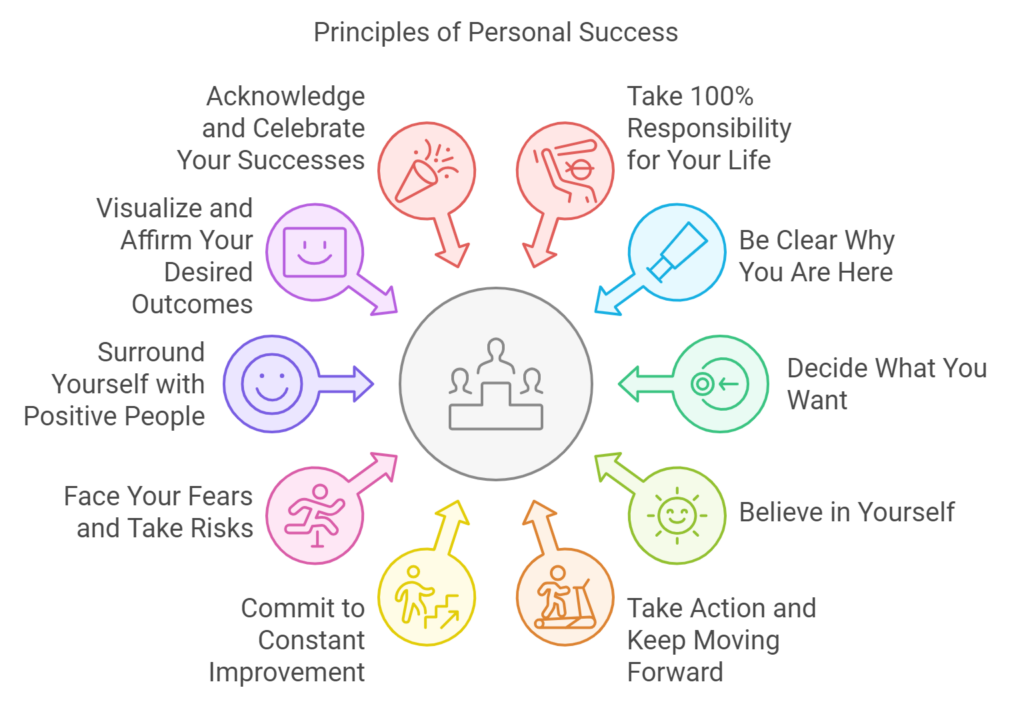11 Key Takeaways from The Success Principles by Jack Canfield
Table of Contents
- Take 100% Responsibility for Your Life
- Be Clear Why You Are Here
- Decide What You Want
- Believe in Yourself
- Take Action and Keep Moving Forward
- Commit to Constant Improvement
- Face Your Fears and Take Risks
- Surround Yourself with Positive People
- Visualize and Affirm Your Desired Outcomes
- Acknowledge and Celebrate Your Successes
- Keep a Positive Attitude

1. Take 100% Responsibility for Your Life
One of the foundational principles of success is to take full responsibility for everything in your life—your actions, thoughts, and feelings. According to Canfield, blaming others or external circumstances prevents personal growth. By embracing total responsibility, you empower yourself to change any aspect of your life.
Example:
If you are not happy with your career, instead of blaming your boss or industry, take responsibility and start making a plan to either improve your situation or find a new path.
2. Be Clear Why You Are Here
Understanding your purpose is crucial for long-term success and fulfillment. Canfield emphasizes the importance of identifying your passions and aligning them with your career and life goals. Being clear on your purpose gives direction and motivation to overcome obstacles and stay focused.
Example:
A person passionate about education and personal development may find fulfillment in becoming a coach, teacher, or mentor, allowing them to live out their purpose daily.
3. Decide What You Want
Many people are unclear about their desires, which leads to indecision and stagnation. Canfield suggests writing down your goals in all areas of life (career, health, relationships, finance) and being as specific as possible. Knowing exactly what you want is the first step to creating a focused path toward it.
Example:
Rather than saying, “I want to make more money,” a clearer goal would be, “I want to earn $100,000 a year through my consulting business within the next 12 months.”
4. Believe in Yourself
Self-belief is essential for success. If you don’t believe in your abilities, you are unlikely to take the necessary actions to achieve your goals. Canfield encourages readers to challenge self-doubt, reframe negative thoughts, and cultivate a strong mindset that expects success.
Example:
Michael Jordan, considered one of the greatest basketball players of all time, was once cut from his high school basketball team. His self-belief drove him to practice harder and ultimately led to his legendary career.
5. Take Action and Keep Moving Forward
A significant theme in The Success Principles is the importance of taking consistent, decisive action. Planning and visualizing are crucial, but without action, goals remain dreams. Canfield advises setting deadlines for your goals and taking daily steps towards achieving them, regardless of setbacks.
Example:
An aspiring author can make their dream come true by committing to write at least one page every day, eventually completing a full manuscript through consistent action.
6. Commit to Constant Improvement
Canfield introduces the concept of “Kaizen,” a Japanese term meaning “continuous improvement.” To become successful, you should constantly seek ways to improve skills, knowledge, and habits. Regularly investing in self-improvement leads to greater competence and better results over time.
Example:
Professional athletes constantly seek ways to improve their performance, whether through training, nutrition, or mental exercises, to stay ahead of the competition.
7. Face Your Fears and Take Risks
Fear is often the main factor that holds people back from reaching their full potential. Canfield emphasizes that facing fears and taking calculated risks are vital components of success. By acting despite fear, you build confidence and expand your comfort zone, making bigger opportunities more accessible.
Example:
An entrepreneur may fear pitching their business idea to investors. However, by doing so anyway, they open the door to possible funding, networking, and valuable feedback.
8. Surround Yourself with Positive People
The people you spend the most time with significantly influence your thoughts, beliefs, and actions. Canfield suggests surrounding yourself with positive, encouraging individuals who support your goals and inspire you to be your best self. Negative people can drain your energy and hinder your progress.
Example:
A person striving to improve their fitness may benefit greatly from joining a group of like-minded fitness enthusiasts, whose encouragement and habits can help them stay motivated.
9. Visualize and Affirm Your Desired Outcomes
Visualization and affirmation are powerful techniques that can help reinforce goals and maintain focus. Canfield encourages creating a clear mental image of your desired outcome and affirming it daily. This process helps to engage the subconscious mind and increase your belief in achieving your goals.
Example:
Olympic athletes often visualize themselves crossing the finish line first, experiencing the emotions of victory, which helps improve their performance and confidence.
10. Acknowledge and Celebrate Your Successes
Acknowledging even small accomplishments helps to build momentum and self-confidence. Canfield emphasizes the importance of celebrating your wins, no matter how minor they may seem, as this reinforces positive behavior and encourages continued effort towards bigger goals.
Example:
If someone sets a goal to eat healthily and successfully maintains this habit for a week, they should reward themselves (in a healthy way) as a form of positive reinforcement.
11. Keep a Positive Attitude
Maintaining a positive attitude is crucial for overcoming setbacks and challenges. A positive mindset opens up possibilities and keeps you motivated, while a negative attitude leads to missed opportunities and diminished efforts. Canfield suggests practicing gratitude, reframing problems as challenges, and focusing on solutions rather than obstacles.
Example:
When faced with a business failure, a person with a positive attitude might view it as a learning experience and quickly pivot to the next opportunity, rather than dwelling on the setback.
If you’re looking to transform your mindset and improve your productivity, there are some powerful books you should explore. Deep Work emphasizes the value of focused work to achieve remarkable results. To unlock financial success, Think and Grow Rich provides proven strategies for wealth and prosperity. Thinking, Fast and Slow offers insights into how we make decisions, exploring both our rapid and slow thinking processes. For strategies on gaining influence, delve into The 48 Laws of Power. To unlock success in all areas of life, The Success Principles provides a roadmap for achievement. Lastly, Mindset explores the power of adopting a growth mindset for personal and professional development. Dive into these books for transformative life changes!

